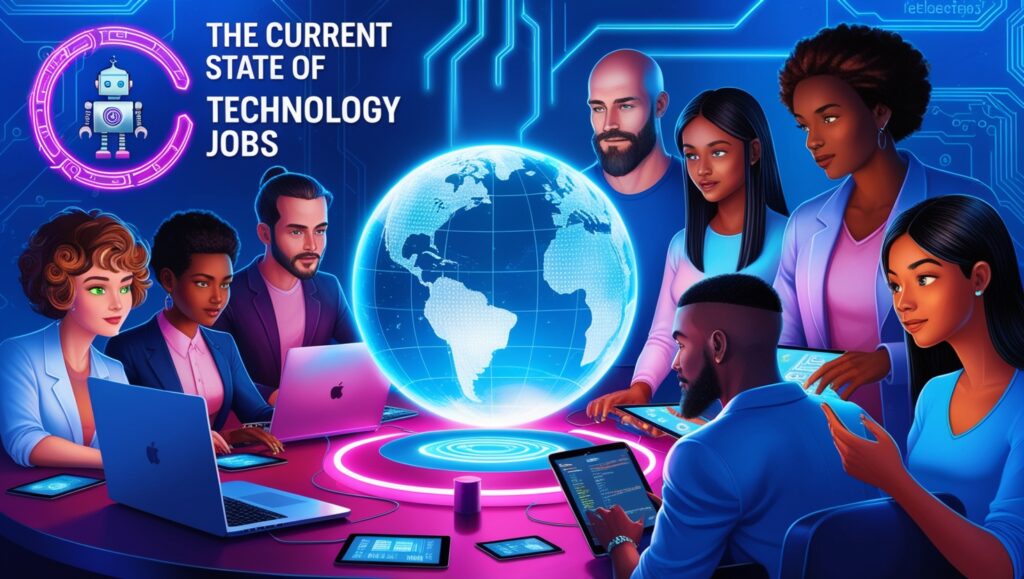Introduction
The technology sector is rapidly evolving, reshaping the job market and creating new opportunities every day. With advancements in AI, cloud computing, and 5G connectivity, the future of technology jobs looks promising yet challenging. This article explores the key trends and sectors that will shape the future of tech employment, providing valuable insights for job seekers, professionals, and employers.
- Introduction
- The Current State of Technology Jobs
- AI and Automation
- Cloud Computing and Data Science
- Cybersecurity Jobs
- Software Development and Engineering
- Remote Work and Global Teams
- The Impact of 5G and Connectivity
- The Role of Blockchain and Cryptocurrencies
- Green Technology and Sustainability
- Tech Careers in Healthcare
- The Gig Economy and Freelancing
- Diversity and Inclusion in Tech
- Lifelong Learning and Continuous Upskilling
- Future-Proofing Your Career
- Expert Insights on the Future of Tech Jobs
- The Future of Tech Jobs by Region
- Predictions for the Next Decade
- Practical Steps for Career Development
- Conclusion
The Current State of Technology Jobs
The demand for technology professionals is at an all-time high, with industries such as finance, healthcare, and retail heavily investing in digital transformation. Key roles currently in demand include software developers, data scientists, and cybersecurity experts, reflecting the growing reliance on digital infrastructure.
AI and Automation
Artificial intelligence is not only transforming industries but also the job market. While some fear AI-driven automation will lead to widespread job displacement, the technology is also creating entirely new roles such as AI ethicists, machine learning engineers, and automation specialists. The challenge is balancing job losses with the creation of new AI-driven opportunities.

Cloud Computing and Data Science
The rise of cloud computing has drastically changed the landscape of IT infrastructure. Companies are shifting towards cloud-based services to improve efficiency and scalability, creating a surge in demand for cloud architects and engineers. Additionally, data science has become an integral part of decision-making, driving demand for data scientists who can interpret and leverage big data for business growth.
Cybersecurity Jobs
As digital threats grow in sophistication, cybersecurity has become a top priority for organizations. From network security analysts to ethical hackers, cybersecurity jobs are in high demand, with a projected growth rate that outpaces many other tech fields. As businesses continue to digitize, this sector will only expand.
Software Development and Engineering
The software development field is constantly evolving, with new methodologies like DevOps and Agile gaining prominence. Developers must stay current with the latest programming languages and tools, such as Python, Go, and Kubernetes, to remain competitive in the job market. The rise of low-code and no-code platforms is also democratizing software creation, opening new doors for non-technical professionals.

Remote Work and Global Teams
The COVID-19 pandemic catalyzed a global shift towards remote work, particularly in the tech industry. With teams distributed across the globe, tools such as Slack, Zoom, and GitHub have become essential for collaboration. As remote work becomes the norm, companies are expanding their talent search globally, offering more opportunities for skilled professionals regardless of location.
The Impact of 5G and Connectivity
5G technology is set to revolutionize connectivity, leading to new opportunities in fields like IoT (Internet of Things) and autonomous vehicles. Faster internet speeds and reduced latency will support the development of new technologies, driving demand for professionals skilled in networking, telecommunications, and edge computing.
The Role of Blockchain and Cryptocurrencies
Blockchain is no longer just about cryptocurrencies. Its decentralized nature is being adopted in industries like healthcare, finance, and logistics to improve security and transparency. Careers in blockchain development and decentralized finance (DeFi) are growing, with many opportunities arising in startups and traditional companies alike.

Green Technology and Sustainability
As the world grapples with climate change, the tech industry is playing a crucial role in developing sustainable solutions. Green technology jobs, such as renewable energy engineers and environmental data analysts, are on the rise. Companies are seeking tech talent to help them reduce their carbon footprint and comply with environmental regulations.
Tech Careers in Healthcare
The healthcare industry is experiencing a digital revolution, with technologies like AI, robotics, and telemedicine transforming patient care. Careers in health tech are growing, with demand for roles like bioinformaticians, healthcare data analysts, and AI specialists in diagnostics.
The Gig Economy and Freelancing
Freelancing is becoming increasingly popular in the tech industry, with platforms like Upwork and Fiverr connecting tech talent to short-term projects. As the gig economy expands, more professionals are opting for flexible work arrangements, driving the demand for freelance web developers, graphic designers, and data analysts.

Diversity and Inclusion in Tech
Diversity in the tech industry is more than just a buzzword; it’s a necessity for innovation. Companies are making concerted efforts to build inclusive teams, realizing that diverse perspectives lead to better products and solutions. Initiatives like Girls Who Code and Black Tech Pipeline are helping bridge the diversity gap in tech.
Lifelong Learning and Continuous Upskilling
The fast-paced nature of the tech industry requires professionals to continuously upskill. Lifelong learning platforms such as Coursera, Udacity, and LinkedIn Learning are essential for staying updated with the latest tech trends. Popular certifications in cloud computing, AI, and cybersecurity can provide a competitive edge in the job market.
Future-Proofing Your Career
To thrive in the evolving tech landscape, professionals need to stay agile and embrace change. Key strategies for future-proofing include continuous learning, building a strong professional network, and earning certifications in high-demand areas. Specializations in AI, cybersecurity, and data science will offer long-term career stability.

Expert Insights on the Future of Tech Jobs
Industry leaders believe that automation and AI will redefine the future of work but emphasize the importance of adaptability and lifelong learning. Experts agree that while certain jobs may be automated, new roles will emerge, offering opportunities for professionals with the right skills.
The Future of Tech Jobs by Region
Tech hubs are emerging across the world, with regions like Southeast Asia, Eastern Europe, and Africa seeing significant growth in tech employment. While Silicon Valley remains a global leader, other cities like Bangalore, Berlin, and Lagos are attracting top tech talent and investments.
Predictions for the Next Decade
The next decade will see the rise of AI-driven automation, quantum computing, and augmented reality. While some traditional tech roles may evolve or disappear, new opportunities will emerge in fields we have yet to fully understand. Staying adaptable and curious will be essential for success.

Practical Steps for Career Development
Building a successful tech career requires a mix of technical skills, soft skills, and networking. Join industry groups, attend tech conferences, and seek mentorship from seasoned professionals. LinkedIn is a great platform for connecting with thought leaders and staying informed about industry trends.
Conclusion
The future of technology jobs is filled with exciting opportunities and challenges. As automation, AI, and other emerging technologies continue to reshape industries, professionals must remain adaptable and proactive in their learning. Whether you’re just starting out or advancing in your career, staying current with industry trends, acquiring new skills, and embracing change will be essential. The key to thriving in this evolving landscape is a commitment to continuous learning and a willingness to explore new opportunities in a dynamic, tech-driven world.
Make $25 – $50 Per Hour Writing Reviews Of Apps On Your Phone Or Tablet
Take a 1-minute quiz to find out what type of app review job you are best suited to. click





